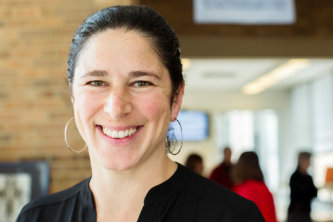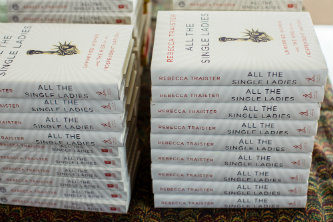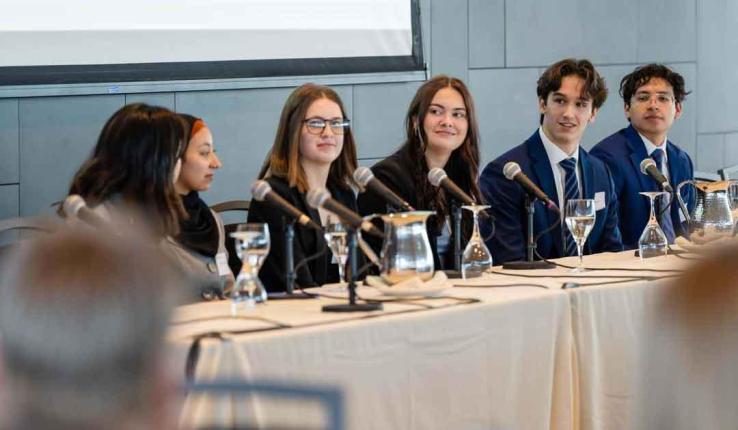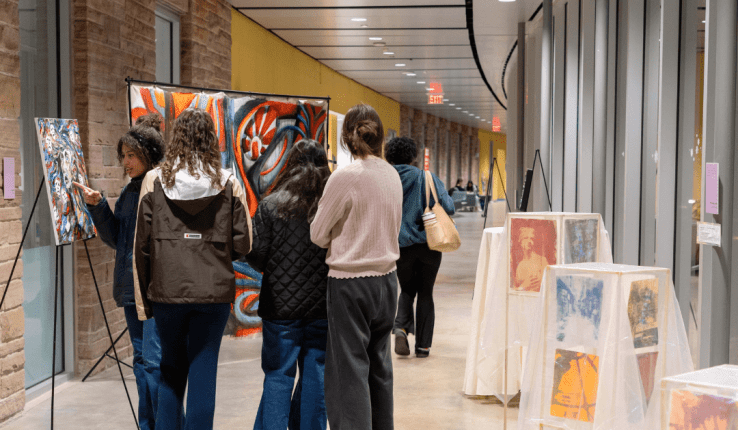Rebecca Traister Sheds Light on 'All the Single Ladies'
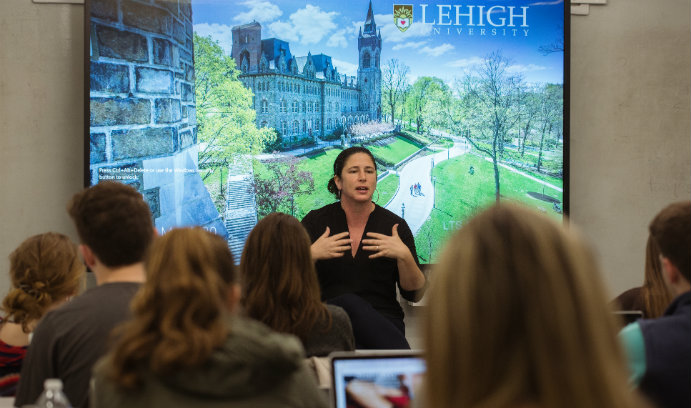
Noted author Rebecca Traister took audience members on a journey of single women in American history. Her mother, emerita professor of English Barbara Traister, taught at Lehigh for about 40 years.
Author and self-described feminist journalist Rebecca Traister spoke at Lehigh on March 30, discussing her bestselling book, All the Single Ladies: Unmarried Women and the Rise of an Independent Nation, her observations of the current political environment and experiences as a woman married for the first time at age 35.
“I had to educate myself on American history from a totally different perspective,” said Traister to a packed auditorium at Lehigh’s Whitaker Lab 303, in describing the genesis of her book and taking audience members on a journey of single women in American history.
The inspiration for the book came from information she knew on the increasing rate of singlehood for women. Traister said that it has increased so much that there are more single women than married women in the country.
“I knew that there was a tremendous shift in mass numbers in terms of how people and women were behaving around marriage,” Traister said.
Traister said she strongly identified as a single woman in her 20s up until she met her now husband. Traister remembers being taken aback by the way people reacted to her marrying at a later age.
“I was a 35 year old. I had a career. I already published a book. My husband is 10 years older than me, he was in his 40s,” she said. “We both had full adult lives. Marriage wasn’t going to define us, kick off our lives together or shape us. We became adults separately. We just so happened to fall in love, and we were getting married.”
With her own personal experience and the trends she noticed among her friends marrying older or staying single and the history of unmarried women, Traister decided to combine the three to bring to light a topic overlooked.
“I was very interested in the fact of the sort of lack of acknowledgment of how crucial it is that the map of female adulthood is really being redrawn, but that a lot of our cultural habits haven’t caught up with it yet,” Traister said.
All the Single Ladies took around five years to write and two to three of those years were dedicated to researching the history of unmarried women. Traister admitted that with all of the useful research she found on unmarried women in the United States, there is a lot more history than she originally expected.
When asked about her favorite part of writing the book, Traister discussed the privilege of including an interview with one of her heroes, Anita Hill, the attorney and law professor who came to public attention when testifying during the 1991 hearings on Supreme Court nominee Clarence Thomas. Traister said she was interested in how Hill’s testimony and how it was received was impacted by her singlehood.
Political and Social Ramifications
Traister spoke about single women, the history of unmarried women in America and how this correlates with 19th and 20th century social movements, ending with descriptions of how singlehood is threatened by our current political environment. The goal of her talk was to explain how the change in marriage for women isn’t because of a certain trend in society or based on what their friends are doing, she said, but part of a bigger picture for women to reach equality.
Traister explained how unmarried women in history gravitated to certain jobs that brought them together, such as teaching or nursing. Traister noted that because these unmarried women came together in these jobs, this led to movements, such as women's suffrage and the temperance movement.
In her book and her talk, Traister identified that the government and current political status have a large impact on the singlehood and marriage of women.
“The ability to live independently is predicated on a government that acknowledges women and supports their independence,” Traister said.
Following a long applause at the end of her talk, Traister answered audience questions and signed copies of All the Single Ladies. One audience member asked about women in politics for 2020 and looking forward, to which Traister responded: “I have optimism about women in politics that I wouldn’t have had a few months ago.”
Lehigh Connection
Traister’s mother, emerita professor of English Barbara Traister, taught at Lehigh for about 40 years, so when Traister was asked to speak, she was happy to.
“Lehigh has a particular place in my heart because it was the place where my mother worked for my entire life,” Traister said.
A writer at large for New York Magazine, Traister is a National Magazine Award finalist and contributing editor at Elle. She has written about women in politics, media and entertainment from a feminist perspective for The New Republic and Salon and has also contributed to The Nation, The New York Observer, The New York Times, The Washington Post, Vogue, Glamour and Marie Claire.
Traister’s first book, Big Girls Don’t Cry, about women and the 2008 presidential election, was a New York Times Notable Book of 2010 and the winner of the Ernesta Drinker Ballard Book Prize.
As a successful journalist, having her own books published and writing for numerous well-known publications, Traister shared some career advice for women: “Don’t ever devalue your work or your ideas.”
The lecture was sponsored by the Friends of the Lehigh University Libraries and the Lehigh University Department of English.
Story by Alex DiBrigida
Photos by Christa Neu
Posted on:


